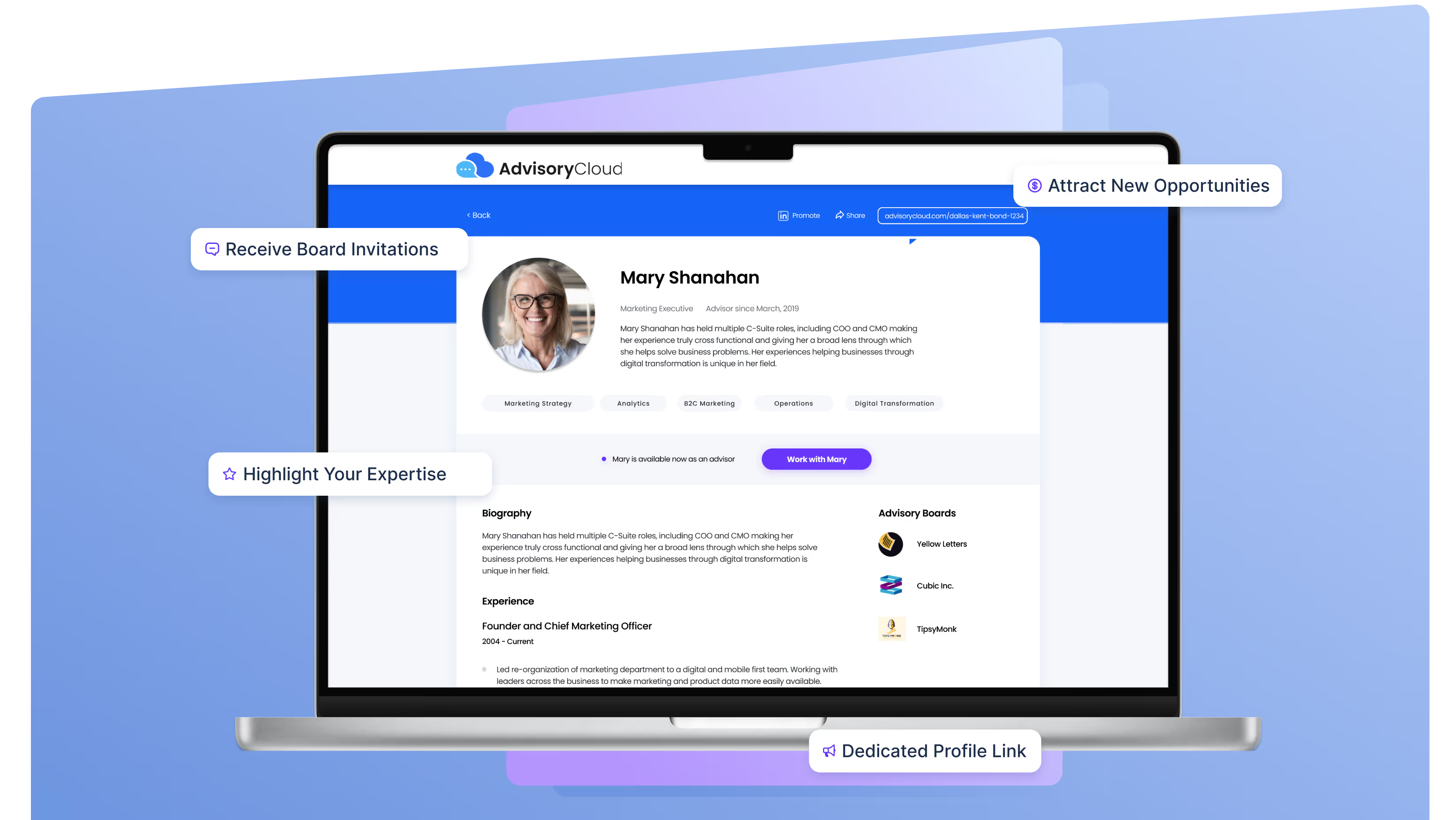August 7, 2023

Become a Successful Startup Advisor: Tips and Strategies for Advising Startups
Being a startup advisor can be a rewarding and fulfilling role. However, it requires a deep understanding of the startup ecosystem and the ability to provide valuable guidance and expertise to entrepreneurs. In this article, we will explore the essential tips and strategies that can make you a successful startup advisor.
Understanding the Role of a Startup Advisor
As a startup advisor, your primary role is to provide guidance and support to early-stage companies. You become a trusted mentor and advisor for founders, helping them navigate the challenges of building a successful startup. Your expertise and experience play a crucial role in assisting entrepreneurs in making informed decisions and avoiding common pitfalls.
To be an effective startup advisor, it is important to understand the various aspects of a startup's journey. This includes understanding their vision, business model, market potential, and scalability. By having a comprehensive understanding of the startup ecosystem, you can provide targeted advice and support that aligns with the unique needs and goals of each startup you advise.
In addition to providing guidance and support, a startup advisor also plays a key role in connecting founders with valuable resources and networks. This includes introducing them to potential investors, industry experts, and other entrepreneurs who can help accelerate their growth. By leveraging your own network and connections, you can open doors for startups and help them access the necessary resources to thrive in a competitive market.
The Benefits of Becoming a Startup Advisor
Becoming a startup advisor offers numerous benefits. Firstly, it provides an opportunity to stay connected with the latest innovations and trends in the industry. By working closely with startups, you are exposed to new ideas and technologies, which can be intellectually stimulating and inspiring.
Secondly, being a startup advisor allows you to contribute to the success of the next generation of entrepreneurs. By sharing your knowledge and expertise, you can help startups overcome challenges and achieve their goals. Seeing the impact of your advice and guidance can be immensely gratifying.
Lastly, becoming a startup advisor can also enhance your professional reputation and network. Working with founders and investors allows you to build valuable relationships that can lead to future collaborations and opportunities.
Furthermore, as a startup advisor, you have the opportunity to expand your skill set and knowledge base. Working with startups often requires a diverse range of skills, from marketing and finance to product development and operations. By immersing yourself in the startup ecosystem, you can acquire new skills and broaden your expertise, making you a more well-rounded professional.
In addition, becoming a startup advisor can provide you with a sense of fulfillment and purpose. By helping startups navigate the challenges of building a business, you are making a meaningful impact on their journey. This sense of purpose can bring a greater sense of satisfaction and fulfillment to your professional life.
Essential Skills and Qualities of a Successful Startup Advisor
To be a successful startup advisor, certain skills and qualities are essential. Firstly, strong communication skills are crucial. As an advisor, you need to be able to effectively communicate your ideas and advice to entrepreneurs, ensuring that it is understood and implemented properly.
Additionally, a successful startup advisor should possess a deep understanding of the startup ecosystem and industry trends. By staying up-to-date with the latest developments, you can provide relevant and informed guidance to entrepreneurs.
Another important quality is the ability to listen and empathize with entrepreneurs. Startups often face unique challenges and obstacles, and being able to understand their perspective and offer empathetic support is vital.
Furthermore, a successful startup advisor should have a strong network and the ability to connect entrepreneurs with potential investors, mentors, and other key individuals who can help them succeed.
Moreover, a successful startup advisor should have a strong analytical mindset. This involves being able to analyze data and market trends to identify opportunities and potential risks for startups. By conducting thorough research and analysis, you can provide valuable insights and recommendations to entrepreneurs.
In addition, adaptability is a key skill for a startup advisor. The startup landscape is constantly evolving, and being able to adapt to changes and embrace new technologies and strategies is essential. This includes being open to learning and continuously updating your knowledge and skills.
Building Your Network as a Startup Advisor: Connecting with Founders and Investors
Building a strong network is crucial for a startup advisor. The more connections you have, the more opportunities you can provide to the startups you advise. Attend industry events, join relevant communities, and be proactive in reaching out to founders and investors. Building strong relationships will not only benefit the startups but also enhance your reputation as a trusted advisor.
When connecting with founders and investors, it is important to demonstrate your value proposition. Clearly articulate how your experience and expertise can contribute to their success. By highlighting your unique insights and track record, you can position yourself as a valuable resource in the startup ecosystem.
Developing an Effective Advisory Relationship with Startups: Communication and Trust
Developing a strong advisory relationship with startups requires effective communication and trust. From the beginning, set clear expectations and boundaries with the founders you advise. Define the scope of your involvement and establish regular communication channels.
Listening is a vital part of any effective advisory relationship. Take the time to understand the startup's vision, challenges, and goals. This will help you provide tailored advice and support that aligns with their needs.
Trust is the foundation of any successful advisory relationship. Always act with integrity and maintain confidentiality. By demonstrating your commitment to their success and consistently delivering value, you build trust and credibility as an advisor.
Navigating the Challenges of Startup Advisory: Overcoming Common Obstacles
Startup advisory is not without its challenges. As an advisor, you may encounter situations where startups struggle to implement your recommendations or face unforeseen challenges. In such situations, it is important to remain flexible and adaptable.
Be patient and understanding with startups as they navigate their unique challenges. Offer support and guidance, and be willing to adjust your approach if necessary. Remember that every startup is different, and what works for one may not work for another.
Overcoming common obstacles in startup advisory requires creativity and problem-solving skills. Encourage founders to think critically and explore alternative solutions. By fostering a growth mindset and providing constructive feedback, you can help startups overcome challenges and achieve sustainable growth.
Creating a Personal Brand as a Startup Advisor: Establishing Credibility and Expertise
Establishing a personal brand as a startup advisor is crucial for attracting new startups and investors. Showcase your expertise and knowledge through thought leadership content, such as blog posts, articles, or speaking engagements.
Utilize social media platforms and professional networking sites to share valuable insights and connect with the startup community. By consistently demonstrating your expertise and providing valuable content, you can position yourself as a trusted authority in the startup ecosystem.
Furthermore, actively seek opportunities to contribute to industry publications or speak at relevant conferences. By sharing your experiences and insights, you can enhance your credibility and visibility as a startup advisor.
Leveraging Your Experience: How to Apply Industry Knowledge to Startup Advisory
Your experience and industry knowledge are valuable assets as a startup advisor. Draw on your past experiences and learnings to provide practical and actionable advice to startups.
Help entrepreneurs understand industry trends and best practices, and guide them in adapting their strategies to meet the changing needs of the market. By applying your industry knowledge in a practical manner, you can significantly enhance the chances of success for the startups you advise.
Additionally, share relevant case studies and success stories to inspire and motivate entrepreneurs. By illustrating how others have overcome challenges and achieved success, you can provide valuable insights and guidance.
Effective Strategies for Providing Valuable Guidance and Expertise to Startups
Providing valuable guidance and expertise to startups requires a strategic approach. It starts with thoroughly understanding the startup's business model, market segment, and target audience.
From there, work closely with the founders to identify their unique challenges and goals. Collaboratively develop a roadmap that outlines key milestones and actionable steps to achieve them.
As an advisor, your role is to provide guidance and support along this journey. Offer insights and alternative perspectives to help founders make informed decisions. Provide constructive feedback and challenge their assumptions when necessary. By offering a balanced approach of supportive guidance and constructive criticism, you can help startups make progress towards their goals.
The Art of Mentorship: Balancing Supportive Guidance with Constructive Criticism
Mentorship is a critical aspect of startup advisory. As a mentor, your role is to guide and inspire startups to reach their full potential. To be an effective mentor, it is important to strike a balance between supportive guidance and constructive criticism.
Show empathy and understanding towards the challenges startups face, while also challenging them to stretch their limits and think outside the box. Recognize and celebrate their achievements, and provide constructive feedback to help them improve and grow.
Remember that mentorship is a long-term relationship. Continuously assess and adjust your approach based on the evolving needs and goals of the startups you advise. By being adaptable and responsive, you can provide the most impactful mentorship.
Understanding Different Stages of Startup Growth: Tailoring Advice for Success
Startups go through different stages of growth, each with its own unique challenges and opportunities. It is essential to understand these stages to provide tailored advice and support.
In the early stages, startups often focus on fine-tuning their business model, identifying a target market, and securing initial funding. As an advisor, help entrepreneurs refine their value proposition, conduct market research, and build a strong foundation for growth.
During the growth stage, startups face challenges such as scaling operations, expanding their customer base, and attracting additional funding. Here, provide guidance on strategies for scaling, securing strategic partnerships, and effectively managing growth.
In the later stages, startups may encounter challenges such as market saturation, increased competition, and the need for further innovation. As an advisor, help startups identify new growth opportunities, diversify their offerings, and establish a sustainable competitive advantage.
Setting Realistic Goals and Expectations as a Startup Advisor: Helping Startups Thrive
Setting realistic goals and expectations is crucial for startup success. As an advisor, collaborate with founders to define clear and measurable goals. Break these goals down into actionable steps and develop a timeline for their achievement.
However, it is important to strike a balance between setting ambitious goals and ensuring they are realistic. Overly ambitious goals can lead to disappointment and burnout, while overly conservative goals may hinder progress. By encouraging startups to aim for achievable yet challenging milestones, you can help them thrive.
Regularly review and reassess goals with founders to ensure they remain relevant and aligned with the startup's evolving needs and market conditions. Celebrate milestones achieved along the way, and use these achievements as motivation for continued progress.
Identifying Potential Risks and Mitigating Challenges in Startup Advisory
Startup advisory involves identifying potential risks and challenges that startups may face and developing strategies to mitigate them. Conduct a thorough analysis of the startup's business model and market dynamics to identify potential risks and vulnerabilities.
Work closely with founders to develop contingency plans and risk mitigation strategies. Help them establish clear processes and systems to proactively address potential challenges. By planning for contingencies, startups can navigate obstacles more effectively and ensure long-term success.
Additionally, leverage your network of investors, mentors, and other advisors to provide startups with the necessary support and resources to mitigate risks. Connections in the startup ecosystem can be invaluable in providing timely and relevant advice during challenging times.
Nurturing Innovation and Creativity in Startups: Cultivating an Environment for Success
Innovation and creativity are key drivers of success for startups. As an advisor, foster an environment that encourages experimentation and thinking outside-the-box.
Encourage founders to embrace failure as a learning opportunity and empower them to take calculated risks. Foster a culture of collaboration and open communication, where diverse perspectives are valued and creativity is nurtured.
Help startups create innovation frameworks and processes to support idea generation, evaluation, and implementation. By integrating innovation into their DNA, startups can constantly adapt and evolve to meet market demands.
Staying Up-to-Date with Industry Trends and Best Practices as a Startup Advisor
As a startup advisor, it is crucial to stay up-to-date with industry trends and best practices. Regularly invest time in learning and self-improvement.
Read industry publications, attend conferences, and participate in webinars or workshops to broaden your knowledge and stay current. Join relevant communities and engage in discussions with fellow advisors, founders, and investors to exchange insights and best practices.
By staying informed about the latest trends and emerging technologies, you can provide startups with valuable insights and help them stay ahead of the competition.
Building Trust with Founders and Investors: Ethical Considerations in Startup Advisory
Building trust is paramount in startup advisory. Ethical considerations should guide your interactions with founders and investors at all times.
Act with honesty, integrity, and transparency. Respect confidentiality agreements and handle sensitive information with the utmost care. Maintain professional boundaries and avoid conflicts of interest.
Always prioritize the best interests of the startups you advise. Provide unbiased advice and recommendations, even if they may conflict with your personal interests. By consistently acting in an ethical manner, you build a reputation as a trusted advisor.
Expanding Your Reach as a Startup Advisor: Leveraging Online Platforms and Communities
Leveraging online platforms and communities can significantly expand your reach as a startup advisor. Create a strong online presence through platforms such as LinkedIn, Twitter, and Medium.
Share your expertise through blogs, articles, or video content. Engage with the startup community through thought-provoking discussions and mutually beneficial collaborations.
Additionally, join online communities and participate in relevant forums or groups. Connect with founders and investors, and share valuable insights and advice. By actively engaging online, you can build a global network and attract startups from diverse backgrounds.
Embracing Diversity and Inclusion in Startups: Advancing the Ecosystem as an Advisor
Diversity and inclusion are essential elements for a thriving startup ecosystem. As an advisor, actively promote and support diversity in the startups you advise.
Encourage startups to build diverse teams, celebrate different perspectives, and create an inclusive culture. Help them recognize the value of diversity in driving innovation and improving business outcomes.
Additionally, be a role model for inclusive behavior. Embrace diverse perspectives and challenge biases. By fostering diversity and inclusion, you contribute to a more vibrant and successful startup ecosystem.
Measuring Success as a Startup Advisor: Evaluating Impact and Celebrating Achievements
Measuring success as a startup advisor goes beyond financial metrics. It involves evaluating the impact you have on the startups you advise and celebrating their achievements.
Set specific goals and key performance indicators (KPIs) to measure the progress and growth of the startups you advise. Regularly assess the impact of your advice and guidance on their success.
Celebrate milestones and achievements, both big and small. Recognize the hard work and dedication of the founders you advise. By acknowledging their accomplishments, you contribute to a culture of success.
In conclusion, becoming a successful startup advisor requires a combination of skills, knowledge, and a genuine desire to support the next generation of entrepreneurs. By understanding the role of a startup advisor, building a strong network, developing effective advisory relationships, and continuously honing your skills, you can make a significant impact on the startups you advise.
See what boards you match with.
See what you qualify for with our 2-minute assessment.


Similar Articles

August 20, 2025
What every CIO needs to do in their first 100 days.
August 20, 2025
The Top 10 Mistakes that CEOs Make
August 20, 2025
The 8 Qualities of high performing CEOs
August 20, 2025
Setting Non-Financial Goals for Career Success
August 20, 2025
How to Choose the Right Mentor: A Comprehensive Guide
August 20, 2025
How to become a business advisor as a VP of Marketing
August 20, 2025
How to Become a Board Member: A Step by Step Guide
August 20, 2025
How networking with your executive peers will help you grow.
August 20, 2025
Do You Need a Sponsor or Mentor to Advance Your Career?
August 20, 2025
Achieving Tech Career Goals for Mid-Career Professionals
August 20, 2025
5 Ways to develop as a leader in your role.





